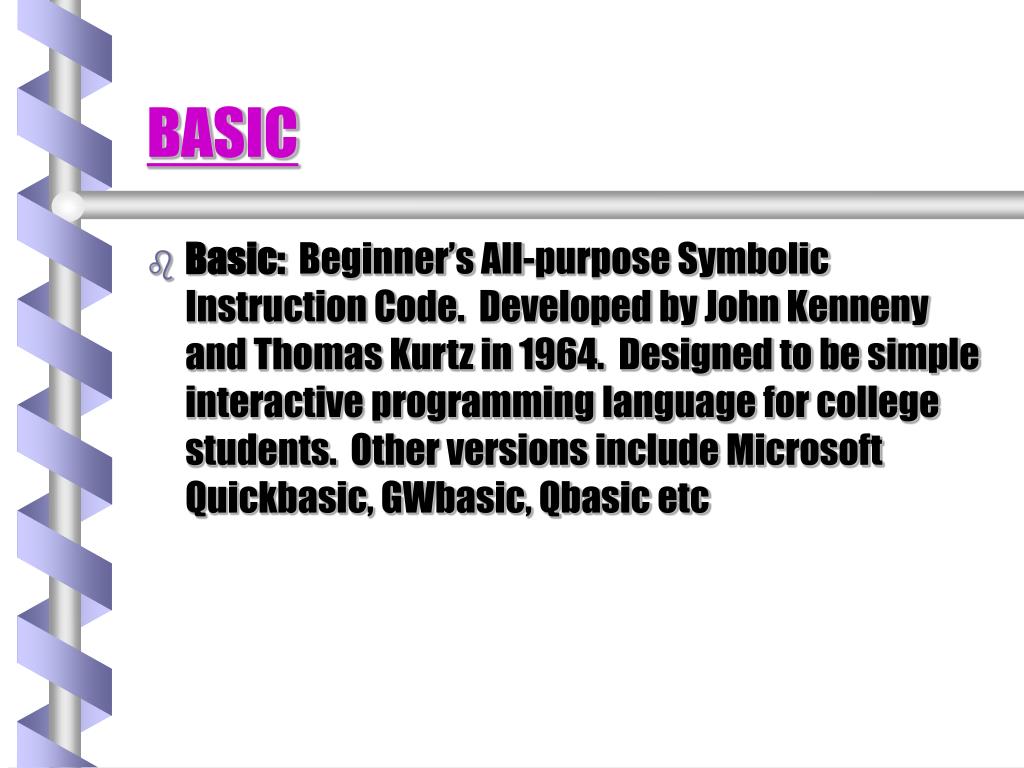

- BASIC PROGRAMMING LANGUAGE SAMPLE CODES DRIVER
- BASIC PROGRAMMING LANGUAGE SAMPLE CODES SOFTWARE
- BASIC PROGRAMMING LANGUAGE SAMPLE CODES CODE

Let’s compute some valuable results from them! Here we have _slices_ (references to arrays): Rust iterators provide many built-in combinators for manipulating data sequences, enabling concise expressions of a programmer’s intent. Iterators are an example of commonly used (and thus heavily optimized) abstractions that they decouple algorithms for sequences of values from the concrete containers holding those values. The usual sources of these optimizations are static polymorphism (templates) and aggressive inlining, both of which Rust embraces fully. However, with clever language design and compiler optimizations, some abstractions can be made to have effectively zero runtime cost.
BASIC PROGRAMMING LANGUAGE SAMPLE CODES CODE
Generally, abstraction comes with runtime costs because abstracted code is less efficient than specific code. “What you don’t use, you don’t pay for.” And further: “What you do use, you couldn’t hand code any better.”Ībstraction is a great tool used by Rust developers to deal with complex code. Bjarne Stroustrup, the creator of C++, describes them as follows: Zero-cost (or zero-overhead) abstractions are one of the most important features explored by C++. In the first article of this Rust language programming tutorial, we’ll describe such two key features as zero-cost abstractions and move semantics.
BASIC PROGRAMMING LANGUAGE SAMPLE CODES DRIVER
Related services Kernel and Driver Development Rust Language Features Now let’s look more closely at the features provided by the Rust programming language and see how they’re useful for developing system software. No overhead in calling C functions from Rust or calling Rust functions from C Only header declarations are needed to call C functions from Rust, or vice versa Using existing libraries written in C and other languages Minimal runtime size (which can be reduced even further)Ībsence of built-in garbage collector, thread scheduler, or virtual machine The standard library fully embraces available pattern matching to provide easy-to-use interfacesĮmbedded and bare-metal programming place high restrictions on runtime environment Pattern matching allows convenient use of structured types Legacy design of utility types heavily used by the standard libraryīuilt-in, composable, structured types: tuples, structures, enumerations Optional types as a safe alternative to nullable pointersĬhecks are avoided where the compiler can prove they’re unnecessaryīuilt-in static analysis detects and prevents possible data races at compilation timeĬompiler requires all variables to be initialized before first use Smart pointers and references avoid these issues by designĬompile-time restrictions on raw pointer usage Use-after-free, double-free bugs, dangling pointers Preferring code duplication to abstraction due to high cost of virtual method calls

BASIC PROGRAMMING LANGUAGE SAMPLE CODES SOFTWARE
Related services Software Development using C/C++ Summary of Featuresīefore describing the features of Rust, we’d like to mention some issues that the language successfully manages. Rust can be used for web applications as well as for backend operations due to the many libraries that are available through the Cargo package registry.


 0 kommentar(er)
0 kommentar(er)
